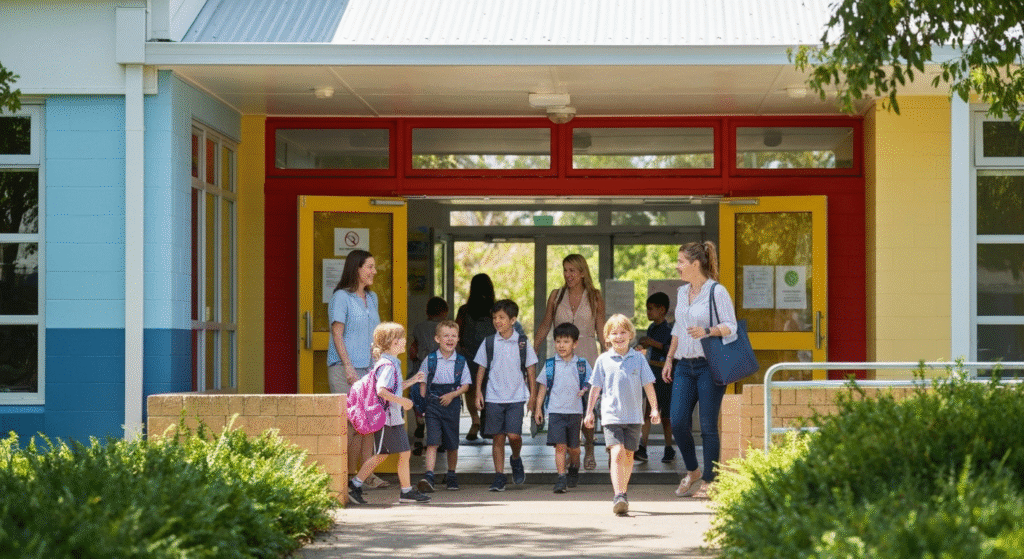
Key Highlights
Choosing the right independent school involves looking beyond academics. Here are the key takeaways for your search:
- Seek schools with a strong academic framework and diverse curriculum options.
- Prioritise institutions that foster student wellbeing through dedicated pastoral care.
- Explore co-curricular opportunities that nurture talents in sports, arts, and debating.
- Examine the school’s ethos and how it builds a vibrant community with a true spirit of community.
- Consider schools that honour local heritage, such as acknowledging the Marin Balluk people, as a sign of deep respect and reconciliation.
- Assess the quality of facilities, such as those at a campus in Keilor, which support a modern learning environment.
Introduction
Choosing the right independent school for your child is a very important choice for their future. It means finding a place where your child can do well in learning, in life, and with friends. The years in junior school and the last years in senior school both matter a lot. The right school gives support and new things to learn, helping students in every way. An Anglican community college like Overnewton is a good example of this. Overnewton Anglican Community College stands for giving care and strong teaching from the first school years until graduation.
Key Factors Parents Should Consider When Choosing an Independent School in Australia
When you start looking for a school, it is important to think about many things. You need to look beyond exam marks. The values a school teaches help shape the way students grow. See how the school works at teaching life skills. Ask how they help your child get ready for everything life brings.
The main ideas of a school, such as those at Overnewton Anglican Community College, should show up in what they do each day. The staff should treat everyone with respect and maintain the dignity of all individuals. The school should also encourage all students to build a legacy of positive impact. Basic things like these are what change a good education into something great. The parts coming next will go into more detail about these key ideas.
1. Academic Excellence and Curriculum Variety
A foundation of our college choices for our children should be built on excellence. You want to pick a school that helps all students reach their full potential. Look for programs at schools in Victoria that are rich and set high goals. They should have classes that fit students with different interests and ways they like to learn. When you see different subjects offered, it shows the school cares about what students need and that it supports every learner.
In Victoria, you can check out how schools get students ready for the Victorian Certificate of Education (VCE). These schools should offer many types of subjects for VCE. Some schools also take part in school competitions. These contests give students new experiences and help their learning journey. A good academic program often gives students:
- Many VCE subjects to pick from.
- Chances for extra help and learning more.
- Ways to join in academic competitions.
Learning should be a lifelong journey. The right school helps your child gain not just facts, but also a big sense of interest and a desire to explore. This way, your child will keep looking for new knowledge and can do well for many years after school ends.
2. Approach to Student Wellbeing and Pastoral Care
A child’s emotional and social wellbeing matters just as much as doing well in school. When you look at schools, it is good to ask about the way they handle pastoral care. Does the school make sure every student is seen, heard, and gets the help they need? You should check if the school has programs that help build things like a strong sense of belonging, resilience, self-esteem, and good friendships with other kids.
Having a strong sense of belonging makes the school years better for students. The best independent schools have a true culture of compassion. Here, students learn to respect, care for, and look out for each other. This kind of place helps kids deal with problems that come up while they grow up, since they know teachers and friends will truly back them up. It’s a good idea to see if the school has people or special programs to support mental health and wellbeing.
When you visit a school, try to notice how it feels to be there. Watch the way the students and staff talk and act with one another. This can show you a lot about the school’s real culture of compassion and if there is a strong sense of belonging for every student so they can grow, feel safe, and do their best.
3. Co-curricular and Extracurricular Opportunities
Learning goes far beyond what the classroom can cover. A good school gives students many chances to find new things they like and skills they did not know they had. Think about what chances there are for your child to try sports like cross country and athletics, do art, or join activities like debating and public speaking.
The things students do outside of lessons help them work in teams, show leadership, and build confidence. You want to see choices that fit all types of people and skill levels. The best programs to look for have:
- Sports teams for athletics, cross country, and more.
- Clubs for debating, public speaking, and performing arts.
- A community engagement program for fundraising and volunteer work.
Being part of these activities lets students become well-rounded people. The activities give them a way to take on new things, feel proud of doing well, and learn if things do not go their way. All of this helps their growth and makes their time at school even better.
4. Community Values and School Ethos
A school’s beliefs and values shape the whole culture there. It is important to pick a school that has values close to your own. Find a place that works hard to give everyone an equal chance and supports a strong spirit of community among students, staff, and families.
The spirit of community often grows when people join in. Everyone is asked to help and get involved. Parents may help by giving their time, students may join service projects, and the school may reach out to the people around them. This way of active engagement helps the school feel like much more than a place to learn. It turns into a network where people support each other. Wise stewardship of our buildings shows that the school cares about its place, both for now and for the future.
It is a good idea to ask school staff how they put their beliefs into action. Does the school have things in place that teach respect, care for others, and honesty? A school with a strong and good ethos gives students a moral compass. This helps guide them and lets them grow into adults who care for others and do the right thing.
5. Facilities, Resources, and Learning Environments
The physical environment plays a significant role in your child’s education. Modern, well-maintained facilities can inspire learning and provide students with the tools they need to succeed. When visiting a school, pay attention to the classrooms, libraries, science labs, and sports grounds. Do they appear to be resources that can support a vibrant and engaging curriculum?
Many independent schools operate across multiple sites to cater to different year levels. For instance, a school might have a junior facility like a Canowindra Campus and a separate senior school at a Yirramboi Campus. This structure allows for tailored environments that meet the specific developmental needs of different age groups, creating a special place today for all students. This approach allows students to engage in meaningful ways with their surroundings.
Investigating the facilities gives you a glimpse into the school’s investment in its students’ future. The availability of modern technology, creative arts spaces, and expansive grounds shows a commitment to providing a holistic and enriching educational experience.
| Campus Name | Location |
| Yirramboi Campus | 2 – 50 Overnewton Rd, Keilor, Victoria, 3036 |
| Canowindra Campus | 39 – 57 Robertsons Rd, Taylors Lakes, Victoria, 3038 |
6. Pathways for Senior Students and Future Success
The main aim of school is to help students get ready for a good and happy life after they finish their studies. The senior school years are important, so it matters a lot how the school helps each student find a path to succeed in the future. You should check if the school offers strong career advice and helps students with choosing and applying for further learning. The move from being a teenager to an adult is a big part of life, and the right help at this stage matters a lot.
You want to look for a senior school that thinks learning goes on all through your life and gives students the skills to keep up, change, and do well in the world as it moves forward. This means the school also helps with thinking plans, creative ideas, and learning to stay strong when things get tough. The main goal is to help students reach their full potential and inspire them to create a legacy of positive impact. Some programs that help with this are:
- VCE subject selection guidance.
- Work experience opportunities.
- Leadership development programs.
You can see how well a school is doing if you look at how its past students do in their jobs or fields. Ask about ways the school keeps in touch with its graduates and if they talk about their old students’ wins. It shows the school cares about a lifelong journey and gives lasting support for its positive impact.
7. Enrolment Processes and Admissions Criteria
Getting your child into an independent school can seem hard, but once you know about the admissions rules, it becomes much easier. Most of the schools have simple rules on their websites or in their booklets. You should check for important things like when to apply, what documents to send, and if there will be an interview or a test.
Some schools let the siblings of students or the children of old collegians go first. So, you should see if this matches your family. The steps you go through also show what matters to the school. For example, some schools with a big philanthropic mindset may want to know if your family likes to help out in the community. The house program is also a big part of life in many schools. This often shapes the way students feel about the place right from when they join.
To apply, you usually need to fill out an online form. The school might then invite you to join a tour or an open day. These times are great for you to ask the staff what you want to know, meet some people, and see if the place feels right. Seeing the house program and the school’s values up close will help you know if this is a good fit for your child.
Conclusion
Choosing the right independent school for your child in Australia is a big decision. You need to think about many things. The main points are academic excellence, student wellbeing, and co-curricular activities. The values and beliefs of the school also matter when making this choice. You should look at the facilities, resources, and the different pathways for senior students. All these things come together to give your child a great learning experience.
When you focus on these points, the school you pick can match your family’s needs. This helps your child feel good at school and do well, both in class and while making friends. If you want to learn more about how to make this choice, you can book a free consultation to talk about your options.
Frequently Asked Questions
What year levels are typically offered at independent schools in Australia?
Most independent schools in Australia, like many in Victoria, give students a full school experience. Students can start in Prep and stay all the way through Year 12. Many of these schools break this journey into junior school, middle school, and senior school. This helps meet the needs of students as they grow. For example, Overnewton follows this model.
How do independent schools support students’ holistic development?
Independent schools help students grow in all areas. The teaching of life skills is mixed with school learning. This is more than books and class work. The schools look after students by offering pastoral care and have house systems for support. With cross-country and other group tasks, students join in and feel a strong sense of belonging. All these things together build up a culture of compassion and make school life helpful in many meaningful ways.
What should parents know about tuition fees and financial considerations?
Parents should think of tuition fees as a way to help the future of their child. The money from fees helps with building care, and it also gives every student a fair chance by adding quality resources. Many schools also help students build a philanthropic mindset. They want families to give to the school and work together for the collective success and the equality of opportunity for all students.







